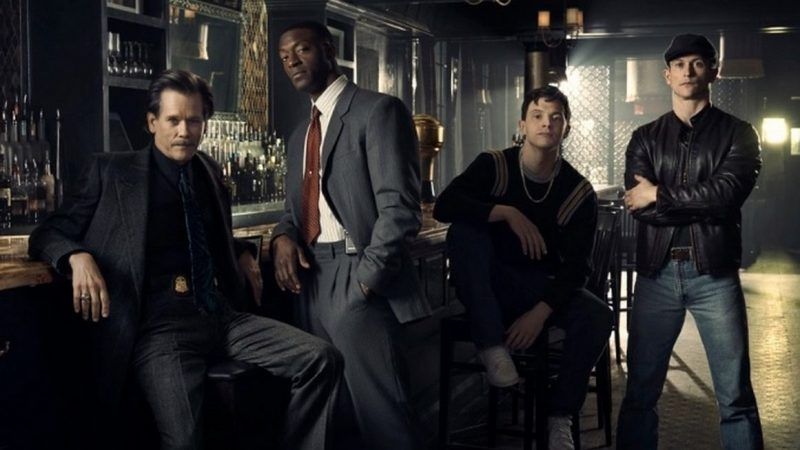City on a Hill Is Boston's Answer to The Wire
Crime, dysfunction, and corruption in Beantown

City on a Hill. Showtime. Sunday, June 16, 9 p.m.
The most wince-inducing expression in American politics is the "city on a hill" metaphor from Jesus' Sermon on the Mount. Jesus was encouraging his followers to evangelize ("a city on a hill cannot be hidden"). American politicians from John F. Kennedy to Ted Cruz have used it to imply the Big Guy was a believer in American exceptionalism, which seems a stretch—the United States didn't come along for another 2,000 years or so—but is nothing compared to the rhetorical gymnastics of the first pol to swipe the phrase, Massachusetts Gov. John Winthrop.
Winthrop used it in a 1650 sermon to demand conformity to Puritan religious doctrine. That included, infamously, putting "witches" and other non-Christians to death, exiling Puritan dissidents and applauding God for sending smallpox to clear out nettlesome local Indians. Call Winthrop undemocratic if you will; he'd revel in the accusation. "A democracy is, amongst civil nations, accounted the meanest and worst of all forms of government," he wrote.
Showtime's new cops-and-robbers drama City on a Hill is definitely using the title in the Winthropian sense. Set in Boston during the city's corrupt, crime-ridden nadir in the 1990s, City on a Hill is the sort of show where cops blackmail not only suspects but one another; where a thoughtful husband is one who doesn't pass along his herpes infection to his wife; where even mourners at funerals have to be bribed to attend; where the mom of a bullied schoolgirl doesn't call either the cops or the principal, just advises her daughter: "You have my permission—break Johnny's dick!"
Partly concocted from leftover bits of the previous Boston crime movies made by executive producers Ben Affleck and Matt Damon (particularly Affleck's 2010 production The Town), and partly from screenwriter Chuck MacLean's fictionalized account of the political cleanup known locally as the Boston Miracle, City on a Hill could reasonably be mistaken for a Bean Town version of The Wire.
Like The Wire, it explores the nexus between crime and politics, and it features the same character array of the clever and the clueless, the ambitious and the burned-out, as a criminal justice task force creakily rouses itself to pursue a nimble criminal syndicate. The resemblance will only grow if City on a Hill is a ratings success, gets brought back for a second season, and—as rumor has it—Affleck and the others turn their characters' attention away from bang-bang crime to public-works corruption and other more purely political matters.
But for now, City on a Hill focuses on an unlikely alliance of corner-cutting cops and idealist prosecutors hunting an elusive and murderous gang of armed robbers who target cash-delivery armored cars.
Kevin Bacon plays Jackie Rohr, a coke-snorting, informant-banging, wise-assing FBI agent who's quick with his fists and slow to see any need to clean up Boston law enforcement. "What used to make this city great," broods Rohr, "was that it was run by bad men who understood that they were bad…Now you can't even call a guy a faggot." Once admired for single-handedly taking down an entire Mafia family, Rohr is now mostly known for his thorough dissolution.
The reform efforts of which Rohr is contemptuous include the appointment of a black assistant D.A. who served on a police-reform commission. Decourcey Ward (Aldis Hodge, WGN's escaped-slave drama Underground) is an outsider from Brooklyn who's derided by both other cops and prosecutors as well as black community activists.
Despite his utter lack of support from anyone on any side, Ward refuses to quit for a corporate sinecure at the firm where his wife works. "I like what my job should be," he insists, to which his wife retorts: "That's not the way things are."
When the robbers kill the entire crew of an armored car in Charlestown, the deeply alienated Irish neighborhood where gangsters like Whitey Bulger operate with police protection, it presents Rohr and Ward with a delicious target of opportunity. Busting the gang would be a high-profile case that would also show up the ineptitude of the local cops. For Rohr, it would be a big score that would allow him to coast into lucrative retirement in the private security industry; for Ward, a chance to lash out at a system he despises, particularly the boss who's keeping him on a short leash: "Fuck him, fuck all of 'em, fuck anyone else who gets in my way."
The action in City on a Hill—both the shoot-em-ups and the political intrigue—is staged competently enough, but it's nothing you haven't seen before in half a dozen or more premium cable shows (including, to be sure, The Wire). What makes City on a Hill go is the performances, especially those of Bacon and Hodge.
Hodge has a reserved elegance as the sort of prep-school-groomed black professional that establishment liberals like to say "cleans up real well." But the smooth exterior conceals a bubbling-up rage that can explode at any moment. And Bacon's portrayal of the borderline-scummy Jackie Rohr is simply riveting, one of those things you can't take your eyes away from as he lies, cheats, steals, philanders, and yet somehow still summons enough all-but-forgotten professional skill to get a difficult job done.
Bacon has spent much of his career in quirkily memorable supporting roles that have left viewers thinking of him as an eccentric player of eccentric characters, the poor-man's-John Travolta of Footloose or the desert rat battling giant earthworms in Tremors; or as the punch line of a hipper-than-thou joke.
But in City on a Hill and his last television project—The Following, in which he played a deeply damaged FBI agent running on rage alone as he pursues a cult serial killer—he's been bigger than life, an eyeball magnet who cannot be contained. Maybe it's time he's recognized as one of the leading actors of his generation.


Show Comments (2)